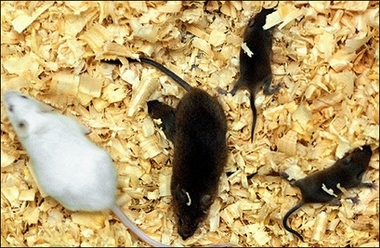Study offers hope of cutting sudden heart attack deaths
(Agencies)
Updated: 2007-12-06 16:30
Updated: 2007-12-06 16:30
PARIS - Grafting gene-altered cells onto cardiac tissue damaged by a heart attack dramatically reduces the risk of sudden death in mice and could one day do the same for humans, said a study released Wednesday.
 Lab mice [Agencies]
|
One in seven heart attack victims die abruptly within three years, mostly from a condition known as arrhythmia, an irregular - and in most cases overly rapid - beating of the heart, said University of Bonn researcher Bernd Fleischmann, who led the study.
In Germany, some 60,000 to 80,000 people experience this kind of "sudden cardiac death" every year, he told AFP.
But a new technique that implants genetically-modified tissue directly into a damaged heart virtually erased the additional risk of arrhythmia in mice that had experienced heart attacks as compared to mice who had not, the study found.
Human heart attack sufferers are frequently fitted with surgically implanted pacemakers designed to deliver electrical impulses to help restore normal rhythm if the heart begins to go haywire.
"But they have a downside," said Michael Kotlikoff of Cornell University, New York, one of the study's co-authors.
"There is no cellular basis for correcting this vulnerability to arrhythmia," he told AFP in a phone interview.
In experiments designed to find such a cell-based solution, Fleischmann and his colleagues transplanted mouse embryo heart cells, called cardiomyocytes, into the hearts of mice that had been induced to have cardiac failure.
"We then directly introduced a catheter into the mouse heart to see whether we could provoke arrhythmia," Fleischmann explained.
The results, published in the British journal Nature, were nothing short of dramatic: the rate of irregular heart activity was the same as with healthy rodents, just over 30 percent.
By contrast, almost 100 percent of a control group of mice which had had heart attacks died when subjected to the same test.
|
|
|
||
|
||
|
|
|
|

